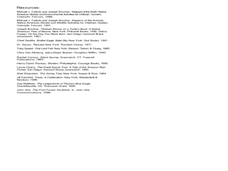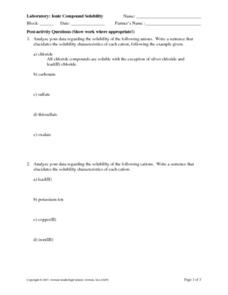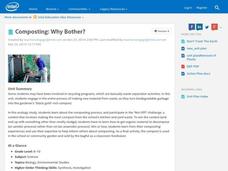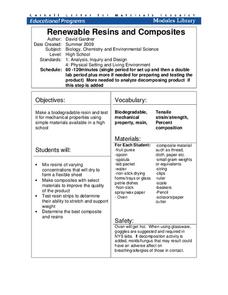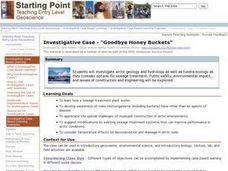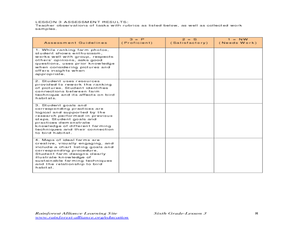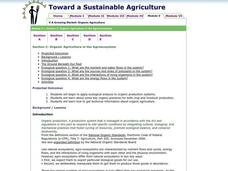Curated OER
Clean Air: Our Health Matters
Middle schoolers learn about the human respiratory system. In this pollution lesson, students identify the parts of the respiratory system and what happens to them when they breathe in polluted air. Middle schoolers learn about the...
Curated OER
The Grand Canyon
Students act as scientists investigating the damming and experimental flooding of the Colorado River by the Glen Canyon dam that took place in 1996. They write a proposal as to whether or not more experimental flooding should be done on...
Curated OER
Red Tail Ridge Wetland Study Project
Fifth graders use a real life scenario of the wetlands to gather information on creatures of the habitat. In this wetlands activity, 5th graders research the interdependence of organisms in a healthy habitat. Students collected samples...
Curated OER
Laboratory: Ionic Compound Solubility
In this solubility worksheet, students answer post activity questions about the lab work they completed with ionic compounds. They write sentences about solubility of cations from their lab work. They write chemical reactions for their...
Michigan Sea Grant
Environmental Decision Making
Pupils participate in a board game activity in which landing on a space called "Decision Card" presents them with a land-use situation to consider and decide how to act. In order to advance in Hydropoly, players must think critically and...
Curated OER
Crisis in Sudan: Responding to Medical Emergencies
High schoolers examine the crisis in Sudan. They identify the medical situation in the region and discover how they respond to emergencies. They research diseases that are prevalent in the region as well.
Curated OER
Prairie Restoration and Prairie Ecology
Students collect data as they identify and classify native prairie plants and insects. They create their own population study using a variety of sampling techniques to determine the population density of various species. Students...
Curated OER
Motion in the Ocean
How does the formation of currents and waves in the ocean happen? High schoolers will learn about the primary causes for ocean currents and waves by calculating a wave's amplitude and nautical mile speed. Then they will complete a...
Intel
Composting: Why Bother?
The first STEM lesson in a group of 10 explores composting. After discussing how to make a better tomorrow, classes are challenged to track garbage in their communities, visit a local waste management facility, and conduct a survey about...
Cornell University
Renewable Resins and Composites
Merge chemistry with environmental science to study biodegradable materials. An engaging activity allows learners to experiment with different resin concentrations and composites. Through experimental tests, scholars test their creations...
Curated OER
Personal Ecosystem
Students build an aquatic ecosystem using large glass pickle jars. In this ecology lesson, students build and ecosystem then observe and collect data on the habitats. In this long term project students observe a population of guppies...
Curated OER
Lab Report Template
Students write a paragraph (complete sentences) which explains what they did in the lab.
Curated OER
Balancing Act
Students investigate the dramatic increase in world population and the unequal distribution of resources. They examine the six world regions and how they are affected by the increase in population.
Curated OER
Thermal Stratification
Young scholars use video, research and experiments to investigate and replicate thermal stratification in a lab. They prepare a report, poster or multimedia presentation showing the results of their work.
Curated OER
Goodbye Honey Buckets
Young scholars investigate arctic geology and hydrology as well as tundra ecology as they consider options for sewage treatment. Public safety, environmental impact, and issues of construction and engineering be explored.
Curated OER
Dr. Heidegger's Experiment
Examine the idea of perpetual youth and immortality while you read Nathaniel Hawthorne's Dr. Heidegger's Experiment. Some links work to direct your learners to information about the Fountain of Youth. Using this information, scholars...
Curated OER
How can my breakfast help the birds?
Sixth graders design farms with a bird's habitat in mind. In this farm lesson plan, 6th graders research how sun grown coffee destroys a bird habitat, and then they make their own farm with a bird's habitat being preserved. They then...
Curated OER
Too Much Oxygen or Too Little?
In this oxygen worksheet, learners analyze date about the oxygen levels in a river to determine the cause of the dying fish. This worksheet has 2 graphs, 12 short answer questions, and 2 graphic organizers.
Curated OER
Pesticides
Students investigate the uses of pesticides and the pros and cons of their use. In this pesticides lesson, students observe simulations of the three classes of pesticides and the effects or actions each has. Students answer 3 follow up...
Curated OER
Microbes and Health
Students participate in activities that show them how tiny germs are spread. For this germs lesson plan, students engage in hands on lessons to show them how microorganisms can easily spread disease through the mouth and hands.
Curated OER
Progression's Price
Students reflect upon their regional and national environments, analyze causes of environmental problems as well as their implications, and examine effects of population growth as they participate in "The Popcorn Game."
Curated OER
Toward a Sustainable Agriculture
Students analyze organic production systems. In this organic agriculture lesson, students examine key organic practices for both crop and livestock. This lesson includes 5 different activities, 4 critical thinking questions and...
Curated OER
Dirty Decomposers
Students explore the ecosystem by conducting a ziploc bag experiment. In this recycling lesson, students identify decomposer organisms in our environment and how they speed up the recycling process. Students utilize a ziploc plastic bag,...
Curated OER
Problem Based Learning Scenario
Students research about the function of MPA's. In this marine science lesson, students explore how humans influence changes near these areas. They explore different MPA's in the Great Lakes region.




